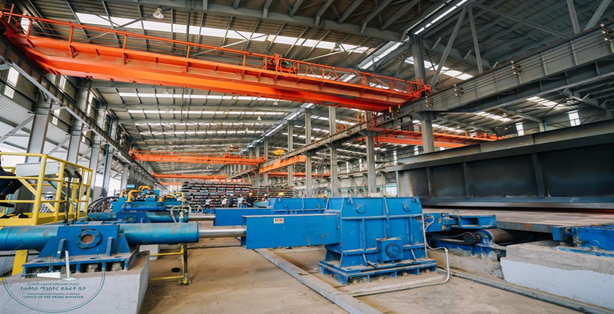
Although Ethiopia is recognized as an agrarian economy, it has been implementing several development programs that will enable it to transit to industrialization. Especially since the reform, it has been busy implementing economic structural transformation projects that will enable the country to become a middle-income country.
However, this journey has also faced many challenges. Inadequate infrastructure, international and domestic conflicts and global pressures have had a negative impact on the transition journey that it has begun. As a result, it is known that manufacturing industries have been forced to produce below their production capacity.
Over the years, the government has implemented operational systems that enable the industry to withstand the challenges it has faced. Especially since 2022, by improving policy and legal frameworks, it has designed and implemented programs that can stimulate the sector’s players and expand the international reach of the country’s products.
The “Made in Ethiopia” movement is the most important of these development programs. For the past three years, the movement has been working to establish a national system that creates conducive environment for sustainable development and competitiveness, and to ensure the success of the homegrown economic reform and the realization of the economic structural transition.
The movement is being implemented with the aim of identifying the problems faced by the manufacturing sector and bringing about sustainable solutions in coordination with the relevant stakeholders; efforts have been made to solve the problems with sense of belongingness at all levels. The movement is being implemented with the aim of enabling the sector to play its part in the economic structural transition; creating favorable and enabling conditions for the growth of manufacturing industries; improving the utilization of average production capacity and increasing productivity; and ensuring the sustainable development and competitiveness of the manufacturing industry.
All stakeholders should work together and coordinate to develop the manufacturing industry sector as a nation and make its operations effective. With this in mind, five clusters headed by the Deputy Prime Minister, consisting of federal institutions, regional and city administrations, have been established. The main purpose of the organization of these clusters is not only to ensure that everyone takes their share and works responsibly but also to meet regularly and monitor the work; it is to create a favorable environment for the actors in the sector by identifying and resolving problems.
Ayana Zewdie (PhD), Coordinator of the Ethiopian Manufacturing Project Office, noted that in the movement’s short journey, many strategies and legal frameworks, including the reform of industrial policy, have been developed and implemented, by fostering a culture of collaboration.
He pointed out that the Ethiopian Industrial Expo has been successfully supporting local producers, attracting foreign investors, and promoting the country’s products for the past two years.
“Among the results recorded in the movement, the provision of credit to high-end industries has increased by an average of 40%, while small and medium-sized industries have increased by an average of more than 75%,” he said. Regarding the input provided to the manufacturing industry, 11.7 million tons were provided in the first 10 months of the 2023/24 fiscal year, which is 1.77 million tons more than the same period in the previous year.
According to Ayana, research and technological results that have been put into production in the manufacturing industry sector over the past two years have shown an average growth of 23%.
In the 2023/24 budget year, 490 industries were provided with electricity meter, line and transformer solutions. Similarly, in the first eight months of the 2024/25 budget year, a total of 522 industries were provided with electricity meter, line and transformer solutions.
Ayana noted that an average of 236,934 permanent job opportunities were created in the manufacturing sector over the past four years, showing a growth of 6.4% compared to the previous year.
Regarding the performance of foreign direct investment, he explained; “94 and 220 foreign investors were attracted in the 2021/222 and 2023/24 budget years respectively.” This shows an average growth of 50% every year; besides, 240 and 889 domestic investors were attracted in 2021/222 and 2023/24 respectively. This is an average growth of more than double every year.
On the other hand, the coordinator indicated that great efforts have been made to ensure that the manufacturing industries play a significant role in the country’s economic growth by substituting products imported from abroad with high foreign exchange.
According to him, by creating the capacity for the manufacturing industry to have comparative advantage and competitiveness, and by substituting strategic products imported from abroad with domestic products, activities have been carried out to narrow the trade deficit.
Thus, in the 2023/24 budget year, foreign exchange amounting to 2.84 billion Birr was saved by substitute production. In the first eight months of this budget year, substitute products worth 2.78 billion Dollars were produced. In general, initial efforts made to identify substitute products with the strategic work of the sector are yielding encouraging results.
According to the coordinator, over the years, coordinated efforts have been made to enhance the productivity and quality of manufacturing industries. As a result, the country has been increasing both the number of products exported and the number of destination countries.
In this fiscal year, a total of 95,167.40 tons of products are exported. This is a 26.9% increase compared to the same period last year. In terms of foreign exchange earnings, a total of 204.4 million Dollars were earned. This is a 12% increase compared to the same period last year.
The sector has grown from 4.8% in the 2021/22 fiscal year to 10.1%. This indicates that the sector has been recording an average annual growth of 44.4%, according to Dr. Ayana. While the manufacturing industry’s contribution to the economy was similar in the 2021/22 and 2022/23 fiscal years, its performance in the 2023/24 fiscal year increased by 1.5% compared to previous years, increasing to 6.8%.
He noted that this result was achieved through greater coordination and sense of belongingness by all stakeholders. There was an opportunity to achieve more than what has been achieved so far.
Minister of Industry Melaku Alebel also made a similar point. He said that the growth of the manufacturing industry could not be achieved without the support of all parties, and stressed that coordination should be strengthened.
According to the Minister, since the movement began in 2021/22, many activities have been carried out. The role of cluster committees is significant in achieving these works.
He stated that the nature of the sector requires support and cooperation from others, and mentioned that one of the issues identified in the movement is lack of institutional coordination. If the manufacturing sector is not supported by resources, finance, infrastructure, capacity building and research, and if new investments are not made, the growth of the sector will not be realized. It is difficult to be competitive as a country if a system and strong ties are not created to support the private sector.
Melaku noted that there is a tendency to grow the service sector from agriculture without touching manufacturing; this will not lead to healthy economic growth. Therefore, everyone must play their role if the manufacturing sector is to grow.
He explained that the launch of the movement has brought the sector out of its slump and has enabled new hope to be seen; closed industries to be opened and put into production, and new investments to be brought in. In a short time, 469 million Dollars in loans were provided to small and medium-sized industries.
According to the Minister, following the launch of the movement, job opportunities have been created for 116,000 citizens. 7,525 new enterprises have joined the sector.
Many industries that had stopped working have also been put into operation. Production capacity utilization has also been increased from 46% to 61%.
He also said that this has created an opportunity to double the share of the sector in the national gross domestic product without creating other new industries.
Therefore, the Minister emphasized that all stakeholders should strengthen their coordination and work together, and everyone is expected to perform their assigned roles responsibly.
“The task of bringing about tangible change in the manufacturing sector is expected of all of us; it is up to all of us,” Melaku said; indicating that each stakeholder should take their own homework and shoulder the responsibility to move Ethiopia forward.
A strong economy is needed to solve the current multifaceted and complex problems; this is a guarantee for a strong country; for a strong democracy; and for lasting peace. “We are expected to do the work expected of our sector that can bring this about,” he added.
BY BACHA ZEWDIE
THE ETHIOPIAN HERALD FRIDAY 18 APRIL 2025





